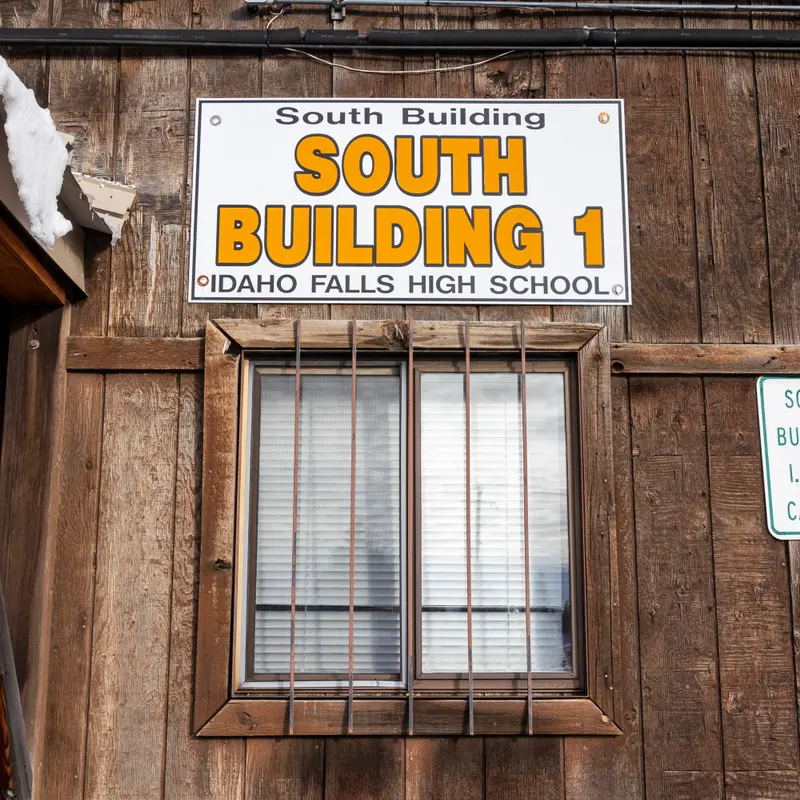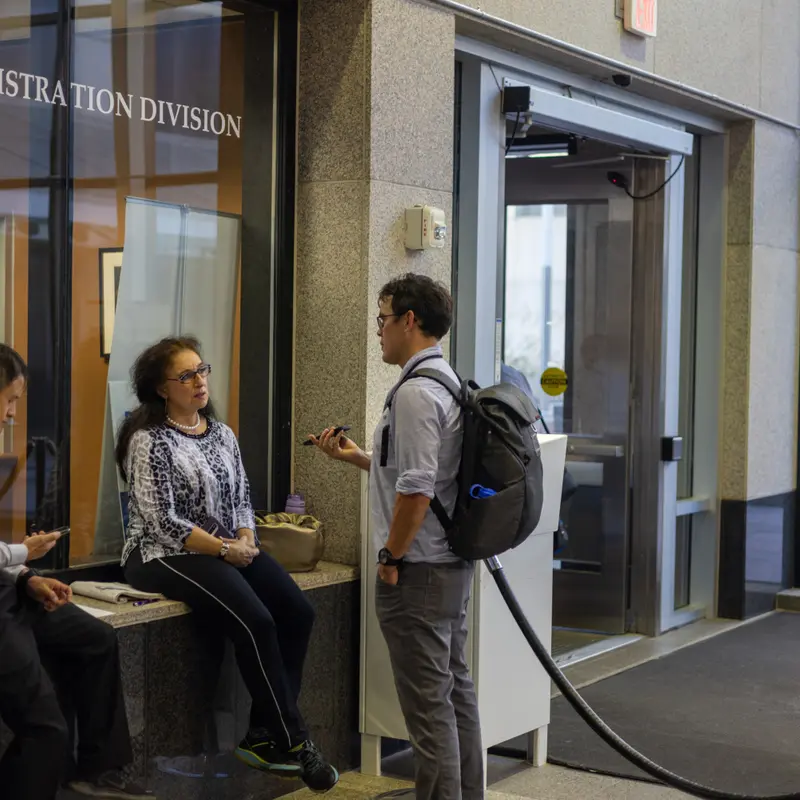Tribal Lenders Say They Can Charge Over 600% Interest. These States Stopped Them.
When reporters set out to quantify the impact of a Connecticut law that allows companies to sell some cars they’ve towed after just 15 days, the DMV said records would cost $47,000; it has revised the estimate but hasn't given us the records.
A decade ago, strange billboards started showing up, including in New York’s Times Square. They weren’t advertising a product. They were vilifying Connecticut’s then-governor, Dannel Malloy.
And they could be traced to that state’s unusual effort to stop an Oklahoma tribe from offering Connecticut residents short-term consumer loans at exorbitant interest rates.
“Gov. Malloy, Don’t take away my daddy’s job,” read one of the billboards, alongside a picture of a Native American child with braids and traditional garb.
But Malloy was not dissuaded by what he called a “scare tactic.” He said he felt the state’s banking regulations were on his side. The Oklahoma tribe was claiming sovereign immunity as it flouted Connecticut law — charging over 400% interest annually, though the state capped rates on such loans at 12%.
“We knew we could win,” Malloy said. “We knew they were harming people in Connecticut.”
He said he came to believe that the sums Native American tribes were making were paltry compared with the money flowing to the outside investment organizations that had linked themselves to the tribes because of the protections that can come with sovereign status.
Connecticut officials spent years fighting in court, but their eventual victory on behalf of the state’s citizens proved a crucial point about regulation at the local level.
Even as federal authorities have struggled to make an impact on this controversial form of lending, a handful of states have upended the notion that tribes’ sovereign immunity must keep state regulators on the sidelines. The lesson: a little pushback can go a long way.
In addition to Connecticut, five other states — Arkansas, New York, Pennsylvania, Virginia and West Virginia — have been remarkably effective at eliminating most tribal loans, which are made online. A ProPublica review of the fine print on more than 80 tribal lending websites shows that the vast majority of tribal lenders now don’t lend in those states.
Highlights From This Series
And a sample of cases filed in federal bankruptcy court bolsters the findings, with few filers in those states listing tribal lenders as creditors. Complaints, too, funneled to the Federal Trade Commission were minuscule in number in these states in recent years.
The six states tend to have strong consumer protection laws overall. Arkansas’ Constitution, for example, limits consumer loans to 17% interest annually. But, more significantly, the states have had aggressive attorneys, working for public agencies or private law firms, who have stepped in to protect consumers from high rates.
“They’d rather stay out than offer a product at a lower rate,” Connecticut Sen. Matt Lesser said of tribal lenders.
“They saw that Connecticut was aggressive in enforcing the law,” said the senator, who helped pass a bill to make such high-interest loans uncollectable in the state.
Minnesota is the latest state to confront tribal lenders.
Shortly before Thanksgiving, Minnesota’s attorney general filed a consent agreement in federal court in which the president of Wisconsin’s Lac du Flambeau Band of Lake Superior Chippewa Indians promised that their tribal businesses would never again lend to Minnesotans at rates that violate the state’s usury — or lending — laws, which caps many consumer loans at 36% interest annually. The attorney general found LDF companies lending at annual rates between 200% and 800%.
The LDF tribe, which is a leading player in the industry, has said its lending business helps people without access to credit, while the profits provide critical funding for tribal government services. It also has defended a common industry practice of partnering with nontribal entities that conduct many of the day-to-day operations, likening it to outsourcing.

It was the second enforcement action Minnesota had secured against tribal loan executives in 2024. Earlier in the year, a Montana tribal lending operation agreed to the state’s demands to stop making loans in Minnesota.
Loans from tribal lenders can carry astronomical rates because the operations claim that the tribes’ sovereign immunity allows them to be governed by federal but not state laws. There is no federal interest rate limit, aside from a 36% cap on loans to active-duty military members and their families.
Good journalism makes a difference:
Our nonprofit, independent newsroom has one job: to hold the powerful to account. Here’s how our investigations are spurring real world change:

Texas lawmakers pushed for new exceptions to the state’s strict abortion ban after we reported on the deaths of pregnant women whose miscarriages went untreated.

The Supreme Court created its first-ever code of conduct after we reported that justices repeatedly failed to disclose gifts and travel from the ultrawealthy.

The Idaho Legislature approved $2 billion for school repairs after we revealed just how poor the conditions were in the state’s crumbling schools.

The EPA proposed a ban on the toxic pesticide acephate after we highlighted the agency’s controversial finding that the bug killer doesn’t harm the developing brains of children.

Support ProPublica’s investigative reporting today.
We’re trying something new. Was it helpful?
Minnesota Attorney General Keith Ellison’s office had watched case law develop around tribal lending to the point where the state felt assured that it could enforce its interest rate caps against a sovereign entity offering loans to Minnesota residents.
In a March interview with ProPublica, Ellison said his office would share its knowledge with other states looking to crack down on tribal lending. “If people want to talk, we would love to see more enforcement action around the country,” he said.
Yet there are limits to what states can accomplish. Courts have ruled that states can only obtain injunctions to stop collections and prevent future harm, but they cannot collect fines or claw back money already lost by consumers. Their enforcement actions do not prevent tribes from making loans in other states. And they are only able to sue tribal leaders, not the tribes themselves.
Tribal Lending Has Largely Ceased in Six States
And these legal battles can be lengthy and contentious, as exemplified by what happened in Connecticut.
In October 2014, Connecticut’s banking regulator ordered websites associated with the Otoe-Missouria Tribe of Oklahoma to stop providing loans to Connecticut residents, citing the state’s cap on interest rates and deeming the loans illegal.
The following spring, the Institute for Liberty, a pro-business organization in Washington, D.C., announced a campaign against Malloy. In social media posts, ads and mailings, the institute alleged that Connecticut’s actions were an affront to tribal sovereignty.
It further argued that the enforcement effort against the Oklahoma-based tribe would deprive Native American families of income for health care, education and employment.
But leaders of two Connecticut tribes uninvolved in lending joined state leaders in a press conference to reject the institute’s claims and to call on tribal lenders to stop taking advantage of the state’s consumers. Only a few dozen of the nation’s 574 federally recognized tribes have engaged in online lending.

As a political entity organized as a nonprofit, the institute did not have to publicly disclose its donors and so was considered a dark-money group. IRS records available online show its tax-exempt status has lapsed. Andrew Langer, the institute’s president, declined ProPublica’s request for an interview. “I have absolutely no comment,” he said in a phone call.
John Shotton, chair of the Otoe-Missouria Tribe of Indians, said in an email to ProPublica: “We did not financially support the campaign, the Institute for Liberty, or their executive director in any way. We had no knowledge of the campaign before learning about it from media sources.”
The Oklahoma tribe stopped lending in Connecticut but initiated a long court battle. The state Supreme Court ruled in 2021 that the tribe’s chair could not face civil penalties but could be subject to an injunction preventing future lending. The state also issued cease and desist orders to three other tribally affiliated lenders, which exited the state as well.
Forceful actions by state officials in New York and Pennsylvania targeting short-term lending also pushed out tribal operations.
In 2013, the New York Department of Financial Services sent cease and desist letters to dozens of online payday lenders, including some tribal lenders, and warned banks to cut off access to lenders operating in violation of state law. Two tribes sued the state to stop the crackdown, but were unsuccessful.
In 2014, Pennsylvania’s attorney general brought an ambitious case against Think Finance Inc., a hedge-fund-backed financial technology firm that was allied with three tribes. The state alleged that the arrangement was designed to enable Think Finance to profit from abusive loans by evading state lending laws. In court papers, Think Finance denied wrongdoing and said that it was not the actual lender on the tribal loans, arguing that it was providing “perfectly lawful services” to the tribes.
The litigation spurred additional private lawsuits, ultimately leading Think Finance to declare bankruptcy and resulting in multimillion-dollar settlements with borrowers.
“This is a model of how aggressive enforcement by one state can lend itself to nationwide relief for consumers,” Gov. Josh Shapiro, then attorney general, said in a press release.
In a 2019 deposition in a consumer lawsuit, an attorney previously involved in the tribal lending industry provided insight into tribal lenders’ avoidance of states where they may draw attention. Asked why a tribe might be advised not to lend in certain states, he replied “to avoid the headache of having to deal with an AG that was being aggressive.”
The attorney, Daniel Gravel, noted that the companies in the case believed that they were “engaging in perfectly legal activities” but “it wasn’t worth the time and effort of having to deal with state regulators who disagreed with us.”
In certain states, it’s not attorneys general or banking officials who are forcing out tribal lenders. The feat has largely been accomplished by private attorneys bringing consumer lawsuits, including sweeping class-action claims.
Most settlements remain confidential, but ProPublica tallied at least $2.9 billion in canceled loans and more than $360 million in restitution from class-action suits since 2019. The major settlements were all filed in federal courts in Virginia and were largely driven by consumer attorneys there.
The class-action cases are highly complex because of the difficulty in unraveling the layers of entities and people involved, which is why the circle of private lawyers challenging the tribal lending industry is small. In addition, private attorneys can be stymied by arbitration clauses in loan agreements, which aim to prevent consumers from going to court.
“This is rocket science. This is among the most complicated litigation you can do,” said Margot Saunders, a senior attorney with the National Consumer Law Center who has served as an expert witness in cases.
Tribal lenders now largely steer clear of making loans in Virginia.
They also largely avoid neighboring West Virginia, ProPublica found. That state has strong consumer protection statutes, and private attorneys and a previous attorney general have used them effectively in lawsuits against tribally affiliated lenders.
Bren Pomponio, a West Virginia attorney for Mountain State Justice Inc., a nonprofit legal services firm that brought a lawsuit against a tribal lender and its business partners in 2020, said that the past decade of litigation has cut through the “myth” that sovereign immunity enables tribal lenders to charge excessive interest rates.
“They thought they had a model to avoid state law, but they don’t really,” he said.
ProPublica is a nonprofit newsroom that investigates abuses of power. Sign up for Dispatches, a newsletter that spotlights wrongdoing around the country, to receive our stories in your inbox every week.
ProPublica is a nonprofit newsroom that investigates abuses of power. Sign up for Dispatches, a newsletter that spotlights wrongdoing around the country, to receive our stories in your inbox every week.







